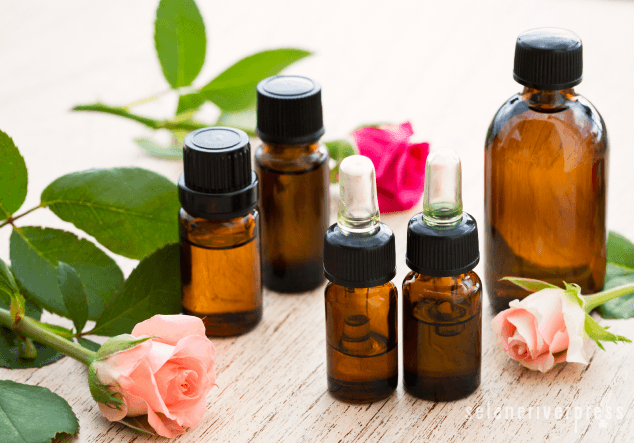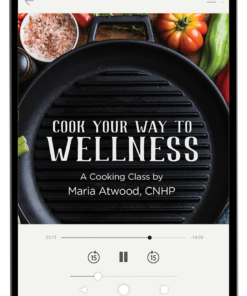My fascination with essential oils began many years ago, when I was making a meal that included lots of jalapeño peppers. Absentminded as to the power of essential oils, I proceeded to cut and scrape out the seeds with my bare hands! Within a few minutes, they were literally on fire with a type of pain and burning I’d never felt before—and hope to never experience again. I spent the rest of the afternoon with my hands in a bowl of cold water filled with lots of ice, with little to no relief. Cooking project ruined!
By some providential spark of clarity, I finally went to my computer to search for solutions on how to alleviate the burning pain caused by handling jalapeño peppers. Turns out I had what’s known as “jalapeño hands.” The treatment: soak your hands in oil! Yes, oil—any oil. Sure enough, shortly after soaking them in a bowl of olive oil, the pain and burning subsided. The reason for this near miraculous cure? Essential oils can only be diluted with oil. They won’t dilute in water. Please remember this very important fact—it may save you from a similar or even worse experience!
My research mentioned that powerful oils are a natural component of many herbs, plants, trees, and spices of all kinds. I also learned that the burning I’d experienced was caused by the essential oils in the jalapeño peppers. No sooner had I recovered when I began my quest to learn more. Fortunately, I found Dr. Raphael D’Angelo, MD, who taught a full-scale course in clinical aromatherapy. A little more than 480 hours later, I proudly stood with my certification as a clinical aroma therapist.
Then I made my sad discovery. After doing all the work to get my certification, I learned about the grand cost of practicing this art form in a clinical setting: a minimum of at least a million dollars in liability insurance. Dream shattered. Nevertheless, I’d learned a great deal. Although I don’t offer any consultations or aromatherapy advice at this time, I still use essential oils personally. And I love, love cooking with them.
Following are some things you should know about these precious, ancient oils, including how to benefit from them and what to be cautious of. I’ve also included two great recipes.
Learn More About Essential Oils: My Personal Recommendations
The book I used in Dr. D’Angelo’s course was called Natural Home Health Care Using Essential Oils, by Daniel Penoel, MD, and Rose-Marie Penoel. This is possibly one of the best foundational works available on the topic. And those who are seriously interested in learning more can check out the same clinical aromatherapy course taught by Dr. D’Angelo that I took.
Health Benefits of Essential Oils
Essential oils are highly therapeutic, and, depending on the particular oil, they can function as an anesthetic, analgesic, antioxidant, antiseptic, and carminative. Some are relaxing, some are stimulating, some are numbing, and some work as a refreshing tonic. For health-related issues, oils can be used as antidepressants or pain relievers, and they can bring about many other profound changes that may be resistant to other modalities. You can also blend essential oils together to bring about even greater effects. Another benefit is the aroma, which is simply too wondrous to describe. Some, such as coconut oil, can even reach and cross the brain barrier.
Are Essential Oils Really Oily? How Are They Made?
No, essential oils are not oily. This is a common misconception. We use the word “oils” primarily in the sense that they are free-flowing liquids. Essential oils don’t stain material, but they will forever leave their aroma for all to enjoy! So easy does it. Essential oils are steam distilled from the actual plant matter, which means they are highly concentrated.
Buying Essential Oils
Where to purchase essential oils is a tricky subject. There are hundreds of websites claiming their oils are the purest, the best, and the most effective! While oils have many uses that don’t require the absolute highest standard of quality, when you’re cooking with them or taking them orally, I suggest you look for essential oils that meet the following requirements stated below. Personal Note: Although I’ve not used nor can I confirm the effectiveness of the product from Hair Loss Revolution this company uses essential oils in their hair growth product made with natural ingredients instead of chemicals and may therefore be worth the try.
- Buy only from companies such as Julia Rose Botanicals and others that clearly state they specialize in premium-grade, organic medical-use essential oils, floral waters, and carrier oils. This statement should be right on their website.
- If using oils for any health issues, confirm that the company has a certified clinical aroma therapist on staff. It’s important to be able to ask basic questions regarding how to use the oil or oils correctly. Holistic practice often involves support for a more serious health issue, so you want to be sure you’re dealing with a certified professional. You can write or email the company or look at the educational profile of the website’s staff.
- If you want to work with a certified practitioner, look for a clinical aroma therapist in your area. The National Association for Holistic Aromatherapy (NAHA) is a good resource.
Cooking with Essential Oils: Two Great Recipes
Finally, we get to the meat of the subject with two yummy recipes for your cooking pleasure. Both are adapted from a book I encourage you to buy. Unlike more clinical study guides, The Complete Book of Essential Oils and Aromatherapy by Valerie Ann Worwood makes learning about essential oils a real joy.
For more recipes, look online or at your local library. When it comes to cooking with essential oils, some of my personal favorites include oregano, basil, thyme, and sage.
Russian Eggs
Ingredients
6 hard-boiled eggs
1 teaspoon chopped green olives
1 teaspoon chopped chives
3 tablespoons mayonnaise (see Nourishing Traditions, p. 137)
1 teaspoon chopped onion
Dash of Tabasco
¼ teaspoon freshly ground pepper
1 teaspoon chopped parsley
2 drops organic lemon essential oil
1 drop organic grapefruit essential oil
Instructions
Cut the eggs in half. Remove yolks and place them in a bowl with all remaining ingredients except the parsley. Mix until it forms a paste, then spoon back into the egg whites. Arrange on a bed of lettuce and sprinkle with parsley.
About the oils used in this recipe:
Lemon essential oil helps regulate the immune system. It also possesses antiseptic properties, and it’s helpful in curing wounds and contagions.
Grapefruit essential oil is rich in antioxidants, much like the fruit itself, and it stimulates the body in a variety of ways. It also stimulates the brain by making it active and giving a new direction to thoughts. In addition, grapefruit oil works on the endocrinal glands and promotes proper secretion of hormones and enzymes, thereby keeping your body’s entire metabolism in proper order.
Orange and Ginger Prawns
Ingredients
1 pound uncooked prawns (king if possible)
2 tablespoons fermented soy sauce (Ohsawa Organic is recommended by WAPF)
2 tablespoons organic sherry
3 tablespoons organic olive oil
1 clove garlic, crushed
2 drops organic ginger essential oil
2 drops organic orange essential oil
Instructions
Place uncooked prawns in a bowl. Mix all remaining ingredients well. Pour over the prawns and leave 1–2 hours. Remove prawns from marinade. Stir fry with 1 teaspoon of marinade until cooked. Add the remaining marinade and cook an additional 5 minutes.
About the oils used in this recipe:
Ginger essential oil is used as a spice in cooking and as a medication, due primarily to its digestive properties. It acts as an antiseptic, a laxative, a stimulant, an aphrodisiac, and a tonic.
Orange essential oil possesses the invigorating features of solar energy, which infuses into our body and the nervous system. It’s extracted from the peel of the sweet orange fruit and enhances the clarity of the mind and emotional balance.
An afterthought from The Traditional Cook…
Last but not least, here are some final important guidelines to leave you with.
Ten Precautions for Essential Oils (EOs) from Dr. Penoel, MD
- EOs do not dissolve in water. They must be diluted with some type of oil.
- EOs in their concentrated state must never come in contact with mucous membranes or sensitive skin areas.
- Never add NEAT (undiluted) EOs to bath water.
- Generally, people with allergies must be very cautious with EOs. The least sensitive skin areas are the soles of the feet.
- Some EOs are light sensitive, so exposure to the sun must be avoided after application.
- Some EOs have strong caustic characteristics and should be used cautiously, generally in a diluted form.
- EOs rich in menthol should not be used near the throat or neck of children under 30 months of age.
- Care must be taken to close all EO bottles after use and to keep them out of the reach of children.
- When taken orally (by mouth), oils must be of impeccable quality. Only take them under the direction of a qualified professional.
- Always keep some vegetable oil readily available when using EOs. Any EO kit must contain a vial of good quality carrier oil.
AUTHOR’S NOTE
To choose your organically grown and fresh ingredients wisely, use the following criteria:
- chemical- and hormone-free meat
- wild-caught fish
- pasture-raised, organic eggs
- whole, unrefined grains
- virgin, unrefined, first-press organic oils
- whole-food, unrefined sweeteners
- pure, clean, spring water
- sea salt
- raw and/or cultured milk and cream products
Photo from iStock/Olgaorly



